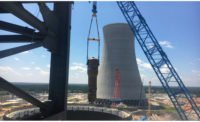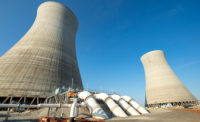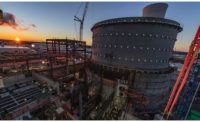Rejecting Georgia Power’s key criteria for continuing construction of its problem-plagued Plant Vogtle nuclear expansion, staff analysts with the Georgia Public Service Commission are strongly recommending that the state reject the utility’s request to pass along virtually all remaining construction and financing costs to ratepayers.
Instead, PSC staffers argued that many costs have resulted from poor project management. The PSC staff recommended that roughly $3.9 billion less than Georgia Power previously requested should be classified as “reasonable,” and thus passed along to ratepayers.
While calling the prospect of completing the project “uneconomic,” the PSC's economics analysts explained: “There is an important difference between providing the commission a ‘reasonable’ forecast of the remaining costs to complete the project versus determining the amount of final project costs that are reasonable for ratepayers to pay. The facts and circumstances regarding why a cost has been incurred must be considered to determine the reasonableness of approving recovery of a cost from ratepayers.”
The economics analysts include Tom Newsome, Philip Hayet and Lane Kollen.
Who bears the costs of construction work in progress by electric utilities has been a sensitive issue many times before in the U.S. In the case of the dramatic cost overruns and delays at Plant Vogtle—and likewise at the other Westinghouse-designed nuclear project in South Carolina—the issue is especially delicate.
"We want to ensure that prudently accrued costs are collectible."
– Paul Bowers, CEO of Georgia Power, in an interview in August, 2017.
In August, Georgia Power had emphasized to the PSC the need to shield the utility and its investors from future risks and costs for continuing with construction. For example, the company stated that the project owners should have the right to abandon the project—while still being able to charge ratepayers for costs—if the PSC deemed “any” portion of the project’s estimated construction or financing costs as “unreasonable or imprudent,” and therefore unrecoverable.
“We want to ensure that prudently accrued costs are collectible,” Georgia Power CEO Paul Bowers told ENR at that time. “We’re requesting a change in costs and an increase in schedule and asking for the commission to determine that reasonable.”
The request was noteworthy in that Georgia Power was requesting costs be determined “reasonable” before they are accrued—the opposite of the standard process of approving them afterwards.
The utility has estimated the new commercial operation dates of Units 3 and 4 as November 2021 and November 2022, respectively.
Plant Vogtle Cancellation Weighed
Determining the project to be “uneconomic” by roughly $1.6 billion, compared to other alternatives, PSC economics analysts posited cancellling construction as a reasonable choice. They also laid out three criteria that the project team should meet if commissioners vote to continue construction, including: “Ensure that Project completion is economic compared to cancellation; provide an appropriate allocation of risks and costs between the company and its customers; and determine now that the costs identified as unreasonable by staff be borne by stockholders, or at the least ensure that unreasonable costs are not approved in advance of an in-depth review of the prudence and reasonableness of actual costs after they are incurred.”
Moreover, they added: “If the commission declines to adopt staff’s going-forward recommendation, we recommend that the project be cancelled and that the commission decline to prematurely provide assurances of recovery in this proceeding.”
The staffers recommended that the “reasonable” Total Project Cost be set to no more than $8.3 billion, consisting of $5.2 billion in capital and construction costs, and $3.1 billion in financing. According to the PSC, that compares to the project owner’s latest total project cost estimate of $12.2 billion for the 68-month delay scenario. That equates to about $3.9 billion more than the highest amount the state believes is “reasonable.”
Analysts: Plant Vogtle Risks Remain
State analysts focusing on construction progress—including Steven Roetger, Ralph Smith and William Jacobs, the state construction monitor—also submitted testimony. While acknowledging some improvement in project management, the group noted that numerous risks remain, and likewise argued that the state shouldn’t grant Georgia Power’s request to approve future costs as “reasonable.”
Specifically, the construction monitors noted that the project’s latest estimate to complete (ETC), while comprehensive, also makes some “questionable” assumptions. For instance, the project team “assumes that design completion, procurement, document closure, the possibility of future quality issues and the availability of needed heavy equipment will support the construction schedule. These are some of the very issues that have impacted the project in the past and have caused much of the delay incurred to date.
Continuing, the analysts testified: “Lack of design completion has resulted in thousands of design changes, many of which have impacted construction. Quality issues with modules, among others, resulted in significant delays … and impacted attempts to stand up new vendors. To assume that these types of issues will not impact the construction schedule going forward is questionable.”
Indeed, much construction remains ahead.
According to the PSC, Georgia Power—which owns 45.7% of the project—has so far incurred costs of $5.85 billion, including $4.44 billion in capital and construction expenses. The utility estimates that it will incur another $6.33 billion over the remainder of the project, including $4.33 billion related to construction and capital expenditures.
Georgia Power to Respond to the PSC
Georgia Power will respond to the state PSC staff’s testimony in hearings that begin Dec. 11. Contacted by ENR, utility spokesman Jacob Hawkins argued that the utility owners of the project were still bearing considerable risk moving forward.
“We are absolutely sharing in the financial risk of the Vogtle project, including severe consequences for delays in place under an agreement with the Georgia PSC,” he stated.
Hawkins added: “Significant penalties as a result of the updated forecast equate to almost half a billion dollars from shareholders, which will reduce the cost paid by customers by approximately $750 million.”
Calling the PSC staff’s recommendations “some pretty devastating testimony,” Tom Clements, senior adviser with Friends of the Earth, was nevertheless unsurprised by their conclusions.
“Given what has happened with the V.C. Summer project and the mounting cost overruns, schedule delays, lingering design issues and general uncertainty associated with the Vogtle project, it's no wonder that the PSC staff has serious reservations about its continuation,” he stated via email to ENR.
“The testimony puts the PSC on notice that huge risks exist if the project is allowed to continue and that both ratepayers and shareholders could be facing significant additional cost liabilities,” Clements added. “The testimony serves as a clear warning to the commissioners that another rubber stamp of what Georgia Power is requesting in no way will provide an assurance that the project can continue to completion.”






Post a comment to this article
Report Abusive Comment